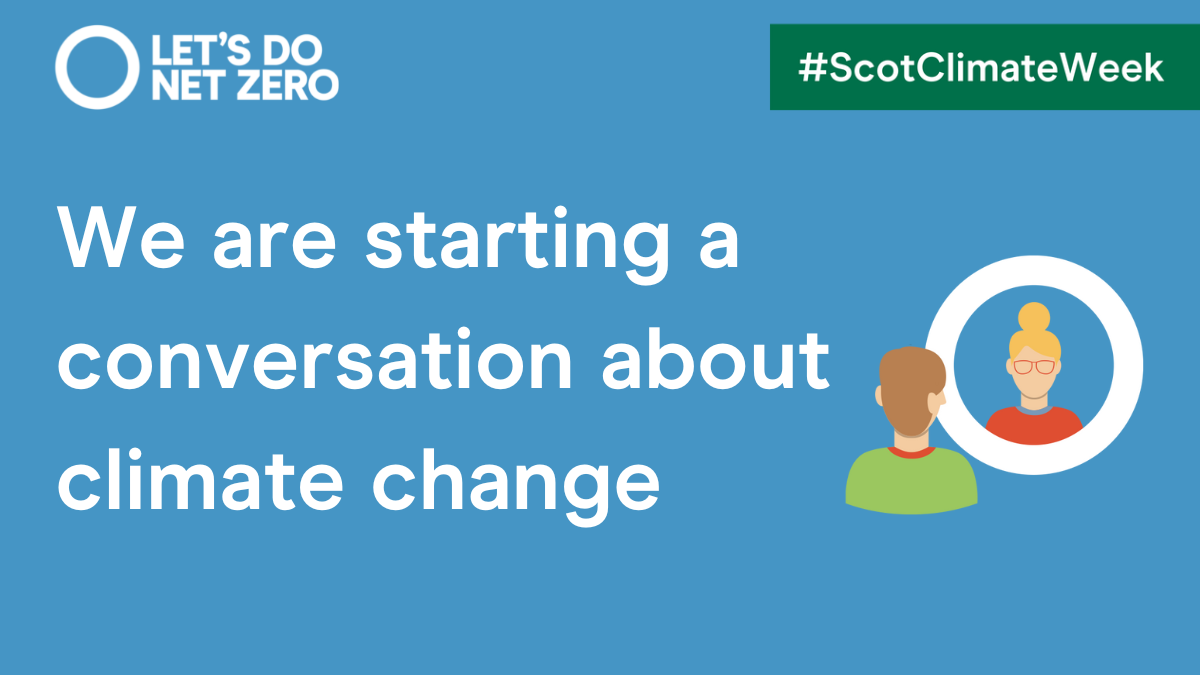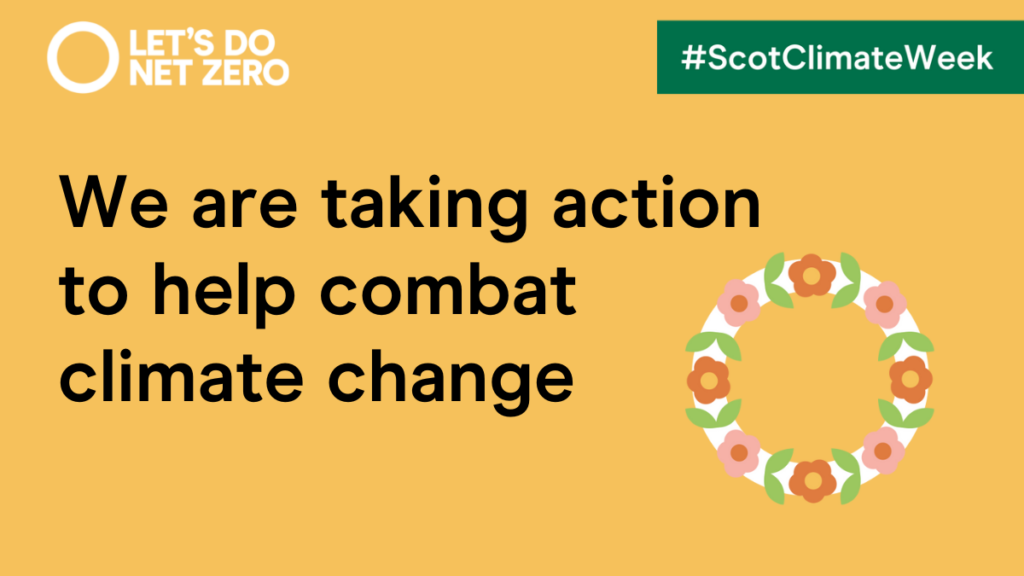#CILIPSGoGreen x Scotland’s Climate Week 2022
Category: Blog, CILIPSGoGreen

Throughout Scotland’s Climate Week 2022, we’ll be sharing ideas and inspiration from our ongoing #CILIPSGoGreen library sustainability campaign, drawing on the wonderful work taking place across Scotland’s libraries to grow environmental understanding and action. Today’s theme is:
Justice
‘Although climate change does, and will continue to, affect everyone, it does not affect all groups equally. With climate change comes inequality… those who already face marginalisation are especially vulnerable to the effects’ (Carbon Literacy Project).
The climate crisis compounds existing inequalities, as well as causing new ones, yet increasingly it seems to many that creating more equitable, just and fair societies around the world could offer the best solution to the environmental crisis that humanity has left at its disposal. As iconic community spaces of free and equal opportunity – ‘palaces of subversion’ in the words of prize-winning author Kirstin Innes – what can Scotland’s libraries do to approach climate action through the lens of social justice?
Listening and Learning
In our last blog post, we highlighted how libraries are and can continue to play an essential role in equipping their communities with the information they need about the climate crisis. And more generally, Scotland’s #LibrariesAreEssential to driving inclusivity through their collections, events and activities.
‘Whether it’s a work of fiction showing life through the eyes of another person to experience a place, an emotion or a situation from a different perspective, or nonfiction, poetry or practical guide books, or even just a place to meet and talk to other people, libraries provide it all…’ notes Christina Riley, founder of The Nature Library (and #CILIPS22 speaker). ‘Literature has the ability to evoke new expressions of empathy and that is priceless in a world where we so desperately need to make challenging choices for ourselves to ensure that future generations don’t have to face even worse ones.
When I think about some of the books I checked out from the Mitchell Library in those months before I started The Nature Library: a John Muir reader Journeys in the Wilderness, The Leviathan by Philip Hoare, and sitting with a reference only copy of Rachel Carson’s The Sea Around Us — the fact that these were available to me, for free, was invaluable. In their own ways they fight against the causes of climate change—capitalism, industrialism, individualism—and in their place encourage a cooperative, community focused society, ones which place value in the learning and personal growth in place of excessive material output.’
Library services like Inverclyde Libraries – along with Western Isles Libraries, part of Scotland’s COP26 Climate Beacons – have also worked creatively to tie their environmental action to wider community concerns, such as food security, which had been a key concern for citizens since the pandemic and led to partnerships with local hospitals and community centres, as well as supporting individual citizens. From seed sharing networks like those of Glasgow Seed Library, empowering people to learn how to grow their own produce, to green fundraising initiatives that highlight the achievements of inspirational women, like Women on the Wall at Glasgow Women’s Library, could your library combine equalities work with your sustainability journey?
‘We can’t build a future for everyone without everyone.’
As Friends of the Earth Scotland illustrate in this powerful blog, ableism is apparent in the environmental movement not only through discriminatory actions that ostensibly aim to increase green credentials – from banning plastic straws outright when some disabled people can’t drink safely without them to designing recycling points that are inaccessible for wheelchair users – but also because the climate crisis itself disproportionately impacts on disabled people worldwide, who are more likely to have been marginalised by poverty and other barriers. While vital work is still ongoing, Scotland’s libraries are leading the way in providing (and promoting) true accessibility for staff and users alike. Examples include everything from South Lanarkshire Libraries collaborating with I AM ME Scotland to create safe spaces that tackle disability hate crime to Academic & Research Libraries Group Scotland sharing how to make online content, including sustainability information, accessible for library users with different requirements. For more on library accessibility or for resources to support you as a library professional with a disability, please visit the CILIPS Accessibility and Neurodiversity resource collection.
As a women-majority sector making strides in tackling gender inequalities – see CILIPS #WINspiration for more and to learn how you can get involved – libraries are also doing essential work to eradicate sexism in ways that will in turn strengthen Scotland’s climate action. As illustrated in this call to action by Sophie Robinson for GWL (a speaker on sustainability at the CILIPS Autumn ReGathering 2021), the more female decision-makers a country has, the more ambitious its climate targets will be. With former President of Ireland Mary Robinson calling on library and information professionals at IFLA WLIC 2022 to increase our commitments ‘tenfold’ to tackle the challenge of the climate crisis – ‘It always seems impossible until it is done,’ she reminded delegates, quoting the late Nelson Mandela – we are convinced that the work of libraries to drive women’s equality truly is making the world a better place, not least in environmental action.
Climate Justice and Library Decolonisation
‘What on earth is climate justice?
Climate justice is about where human rights, social justice and the climate and environmental movement intersect. It is the need to recognise climate change as a systemic issue, which is not purely environmental or scientific but also ethical and political. An issue which includes conversations about equity, colonialism and the disparity between distribution of resources and wealth. Climate justice connects up intergenerational issues and stewardship for future generations, it is about renewing the social contract to protect those most vulnerable, both locally and globally.’
Julie’s Bicycle – Deciphering Green Gibberish.
As the above definition emphasises, historic injustices like colonialism and its intergenerational repercussions are entwined with the causes of the climate crisis itself, and libraries worldwide continue to undertake the challenging yet necessary ongoing work required to decolonise their collections and institutions. From Read Woke South Ayrshire at CILIPS22 to the National Library of Scotland’s Struggles for Liberty learning e-resource, which was a key feature of CILIPS’s Decolonising Library Collections: Past, Present and Future online learning for Black History Month 2021, the work being done by libraries within this integral, intersecting area (please see the CILIPS evolving Anti-Racism resource collection for more) is vital to both climate and broader social justice. In this year’s CILIPS Black History Month webinar, we will also be delighted to welcome Professor Zita Cristina Nunes, Associate Professor of English at the University of Pennsylvania to introduce Dorothy Porter: the critical cataloguing pioneer whose groundbreaking yet poorly acknowledged contributions continue to shape our profession. By offering free, comprehensive access to their diverse and dynamic collections, libraries are unique in allowing everyone, from every background, to listen to untold stories that can inspire us to take the action needed to turn the tide on climate degradation. This essential role was also apparent in this inspiring online learning event about the Cataloguing Code of Ethics:
Our sector has an indispensable part to play in to not only righting the wrongs of the past but exposing inequalities, challenging injustice and signposting the way to something better. In every sense, our world needs libraries now more than ever.
by CILIPS Membership Officer Kirsten MacQuarrie
Please consider joining the CILIP Green Libraries Network to be part of a collaborative online platform for Green Champions across LIS where we are creating ideas, supporting each other and shaping the future of the Green Libraries Partnership.
